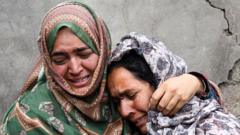Nambala Keshava Rao, a high-ranking Maoist leader, was killed during a confrontation with Indian security forces in Chhattisgarh, marking a pivotal moment in the government's ongoing crackdown on the rebel insurgency.
Major Blow to Maoist Insurgency as Indian Forces Kill Top Leader

Major Blow to Maoist Insurgency as Indian Forces Kill Top Leader
The recent death of a prominent Maoist figure signals a significant escalation in India's efforts against the long-standing rebellion.
A fierce gunbattle in Chhattisgarh resulted in the death of Nambala Keshava Rao, a key Maoist leader known by multiple aliases, including Basavaraju. His death on Wednesday forms part of a broader effort by Indian security forces, led by the country's Home Minister Amit Shah, amid an intensified campaign to dismantle Maoist operations. The conflict also claimed the life of one police officer. Shah highlighted this operation as the first successful takedown of such a senior Maoist figure in 30 years, emphasizing the government's commitment to squash the insurgency by March 2026.
Rao, the general secretary of the outlawed Communist Party of India (Maoist), was on the National Investigation Agency’s most wanted list. The skirmish erupted in Narayanpur district following intelligence indicating the presence of high-ranking Maoists in the region. Prime Minister Narendra Modi publicly commended the security forces for their success.
In response to the high-profile deaths, the Communist Party of India condemned the actions and called for an independent investigation. This altercation occurred shortly after the government initiated Operation Black Forest, a large-scale military campaign targeting Maoist factions. Since the operation commenced, authorities stated that 54 rebels have been apprehended, with another 84 surrendering across Chhattisgarh, Telangana, and Maharashtra.
Despite some overtures from the Maoists for dialogue, which would include a cessation of military actions, Chhattisgarh officials have maintained that negotiations must occur without preconditions. The Maoist movement, rooted in the ideologies of Chinese revolutionary Mao Zedong, has its origins in West Bengal in the 1960s and has expanded into a large part of India, particularly within a "red corridor" stretching across northern and central regions.
Historically, Indian state responses have fluctuated, with significant numbers of casualties resulting from confrontations annually. Government data reports the deaths of over 287 rebels last year alone, predominantly in Chhattisgarh. Since the inception of the insurgency, estimates suggest more than 10,000 lives have been lost, showcasing the enduring violence surrounding this conflict.






















